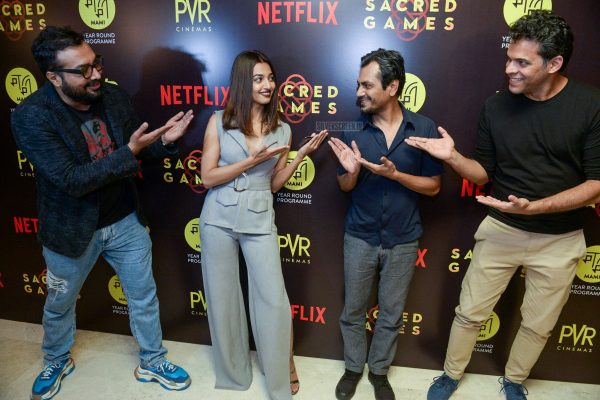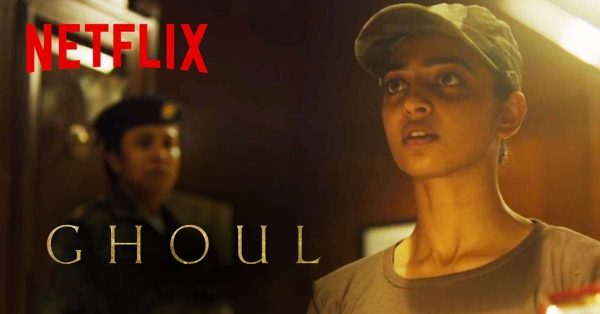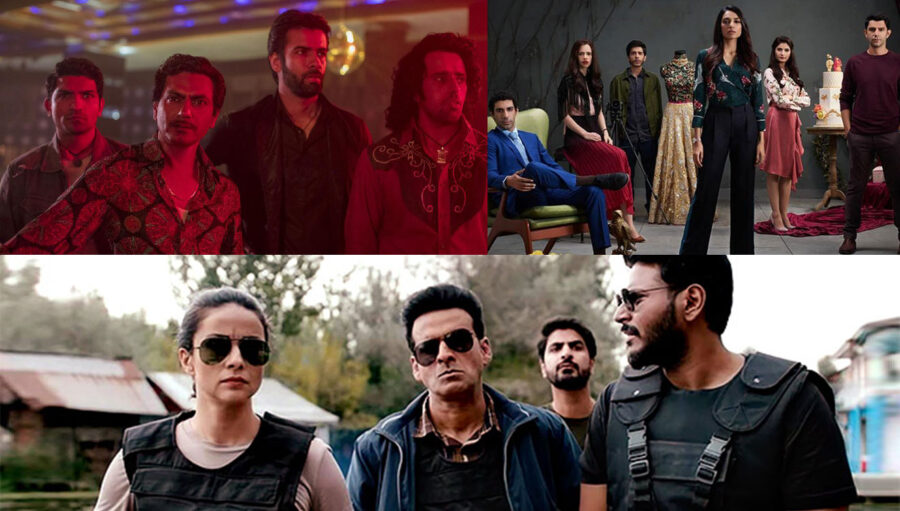Actor Vicky Kaushal was a mousy young man in the most controversial segment of Netflix’s Lust Stories, directed by Karan Johar, and in Netflix original film, Love Per Square Foot, he played a middle-class Mumbai youth who does an average job, falls in love, and dreams of buying a house of his own. The characters he plays in series/films on the web platforms are, curiously, different from his image in mainstream Bollywood where he is best known for playing an aggressive army officer screaming “How’s The Josh!” in the ultra-nationalist film Uri: The Surgical Strike.
Nawazuddin Siddiqui’s biggest experimentation as an actor this year was in, Thackeray (2019), where he played a character that is unlike anything he has done in recent times. But his performance went unnoticed in the wave of criticism the film received for its lenient and sanitised depiction of its protagonist, Bal Thackeray, one of the most controversial political figures of India. Undoubtedly, what took Siddiqui’s name far and wide post Anurag Kashyap’s Gangs of Wasseypur though was Sacred Games, the Netflix original series which completed its second season in August 2019. Recently, Spanish author Paolo Coelho said that he was a fan of Siddiqui’s performance as Ganesh Gaithonde, a gangster in Mumbai in Sacred Games. Siddiqui was also part of British crime series, Mcmafia (2018) that aired on Zee Café.
The multiple Over The Top (OTT) platforms, which arrived in India in the beginning of this decade and gathered momentum with Netflix opening an India office in 2016, are an alternative space for filmmakers, writers and artistes who want to take up audacious projects that break conventions and go beyond the capacities of traditional platforms.

This year, Sacred Games received two nominations in International Emmy Awards. Actor Radhika Apte has been nominated for her performance in Netflix’ anthology film, Lust Stories. Last year, Amazon Prime Videos’ Inside Edge, starring Vivek Oberoi, was nominated in the best drama category of International Emmy. Post the announcement of the nominees, Bruce L Paisner, president and CEO of the International Academy of Television Arts & Sciences was quoted as saying,” The diversity, geographic spread and quality of this year’s nominees is a testament to the increasing wealth of outstanding television being created on a global scale.”
Irrespective of whether Sacred Games and Apte will win the awards or not, there is no denying the fact that Indian OTT platforms are passing through a bright phase.
Ekta Kapoor’s two-year-old ALT Balaji has a record 27 million subscribers. A humongous amount of money is being poured into web series and web films by companies such as Netflix and Amazon Prime. Sacred Games, which completed two seasons, is among Netflix’s most successful original content from India. According to a Mint report, the streaming platform has spent nearly ₹100 crores on the series which is the highest for a web series in the country.
The show is an adaptation of Vikram Chandra’s 2006 novel of the same name and is centered on a Mumbai policeman, played by Bollywood star Saif Ali Khan, who gets a strange phone call one night from a criminal, played by Nawazuddin Siddiqui. Radhika Apte plays a central intelligence officer. In November last year, Netflix’s vice president of product, Todd Yellin, said at ‘See What’s Next’ event in Singapore that the Season One of Sacred Games directed by Vikramaditya Motwane (who is also the show-runner) and Anurag Kashyap, was watched by ‘twice as many people outside India’. Netflix provides filmmakers with an opportunity to connect to the audience all over the world. This access is something traditional film industry is still grappling with. At the ‘See What’s Next’ event, Ted Sarandos, Chief Content Officer for Netflix, said that more than half of Asian content hours viewed on Netflix in 2018 were viewed outside the region.
Filmmakers aren’t bound by censorship laws and unsaid rules of conservatism that they follow while making films off-web. This might have resulted in the creation of web content such as Sacred Games, Ghoul and Leila which are not subtle in their socio-political criticism. Amazon Prime’s Made In Heaven, a series created by Zoya Akhtar and Reema Kagti, subverted several popular perceptions and norms. One of its two central characters is a gay man who files a petition at India’s Supreme Court against Section 377 of the Indian Penal Code which criminalises gay sex. Indian Netflix also hosts documentaries and talk shows, such as Patriot Act with Hasan Minhaj , created by the American comedian-political commentator Minhaj and Prashanth Venkataramanujam, which is highly critical of the far-right political groups that are ruling the roost in India.
This is significant in an era where there is a proliferation of nationalistic content and an increase in censorship in Indian film industries, especially Bollywood, over the past few years, a reflection of the changing political wave in the country. While Bollywood and other film industries in India are directly under the ambit of the state, Netflix shows are safeguarded by their globality.

ghoul
In India, bringing OTT platforms under censorship is complicated since the government cannot regulate players that don’t come under the Cinematograph Act of 1952. They can release any feature film or series without getting certification or approval from the CBFC.
The outrage against OTT platforms largely stems from the view that the online shows showcase vulgar and morally-unethical content. Earlier this year, a non-governmental organisation, Justice for Rights, filed a PIL asking for censorship of online content at the Supreme Court of India, in response to which the court sent a notice to the central government seeking its views. The first of such legal petitions against an OTT show was filed by a Congress party member in 2018, for insulting former Prime Minister Rajiv Gandhi in a scene in Sacred Games‘ maiden episode.
Right-wing political parties in India have increasingly been alleging that the online media are being used to spread anti-Hindu sentiments. An Economic Times report, yesterday, said that “Rashtriya Swayamsevak Sangh (RSS) representatives held over six informal meetings in the last four months with officials of online streaming platforms to restrict ‘antinational’ and ‘anti-Hindu’ content on shows.

This seems to be in line with a piece that was published in RSS’ official magazine Panchjanya recently, that accused Manoj Bajpayee starrer latest Amazon Prime web series, The Family Man, of trying to “create sympathy for terrorists by establishing a narrative around why they pick up guns”. The piece cites series like Sacred Games and Ghoul to allege that information and broadcasting media in India are being used vigorously over the last few years to propagate anti-national and anti-Hindu content by Leftist and the Congress-leaning producers. Even police complaints have been filed for this cause. Ramesh Solanki, a member of Shiv Sena IT Cell, filed a police complaint against Netflix alleging that the US-based online streaming service is “defaming Hindus and India” through shows hosted on its platform on September 9, 2019.
In India, Netflix seems to be on its back foot. After Sacred Games got into legal trouble, the company adopted a self-censorship policy, which means it will not use content that ‘disrespects India’s flag or encourages terrorism or other forms of violence against the state, or hurt religious sentiments”. Netflix CEO Reed Hastings, in a media round-table in Los Angeles in March, said that self-regulation was aimed to help protect creative freedom.
Recommended
Interestingly, it is not just the conservative India that has a problem with the liberal nature of platforms like Netflix. In 2018 YouGov’s BrandIndex report said that conservative viewers in the United States Of America were turning off Netflix. The platform’s increasingly ‘leftist’ political stand was said to be a reason. In January 2019, the Kingdom of Saudi Arabia had censored an episode of the Patriot Act with Hasan Minhaj which took a jibe at its Crown Prince Mohammed bin Salman in response to a request from the country’s Communications and Information Technology Commission.
If the Indian government succeeds at controlling global players such as Netflix and Amazon Prime in their operations in India, it will indicate a danger worse than homogenisation of the nature of visual content across all platforms. It will axe the belief that internet is the last free space where a dissenting voice won’t be clamped down.
****



